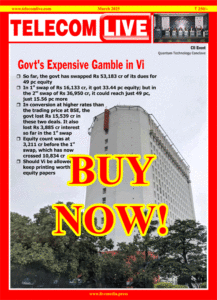India, UK to jointly explore initiatives in telecom, AI, Open RAN, 6G
India and the UK have agreed to explore potential joint initiatives in the fields of telecom, artificial intelligence (AI), and emerging technologies such as the Open Radio Access Network (Open RAN).
Further, the Centre for Development of Telematics (C-DoT) and Berkshire-headquartered Sonic Labs also signed a Memorandum of Understanding (MoU) on Open RAN-related policy and technical matters, including 5G Open RAN and Artificial Intelligence in 4G and 5G, according to an official statement released by the Ministry of Communications on Friday.
These announcements come as Neeraj Mittal, Secretary, Department of Telecommunications (DoT), is in the UK to engage with the Department of Science, Innovation and Technology (DSIT), UK and explore opportunities for collaboration in next-generation telecommunications, artificial intelligence, and space technology, further strengthening India-UK ties in these critical areas.
Mittal met with Chris Johnson, National Scientific Adviser, and Dave Smith, National Technology Adviser of DSIT, and the officials discussed emerging technologies and their applications in 5G, 6G, and digital infrastructure security, the ministry said.
The telecom secretary also met with Geoff Huggins, Director, Digital Directorate, government of Scotland, to discuss collaborative efforts in digital transformation through telecom, telecom security, and emerging telecom technologies, according to the statement.
Furthermore, Mittal met with Jean Innes, CEO of the Alan Turing Institute, for discussions on potential collaboration in digital twins, AI for telecom security, ethical AI, and fostering an AI innovation and startup ecosystem.
Additionally, Mittal visited Scotland’s 5G Centre at the University of Strathclyde and the 6G Research Centre at the University of Glasgow’s James Watt School of Engineering, and discussed collaboration in 6G innovation, future sensing technologies, the exchange of technology such as the 5G stack, and student exchange programs to foster academic and industrial partnerships.
The countries have also agreed to establish joint Centres of Excellence focusing on telecom cybersecurity, AI in telecom, and digital twins; collaboration with British telcos to leverage mobile phone data for infrastructure planning along the lines of India’s success in using such data for metro route planning; joint contributions to the International Telecommunication Union (ITU) for IMT 2030 (6G) standards development; and promoting India’s indigenous 4G and 5G stack developed by C-DoT, among others, the ministry said.



